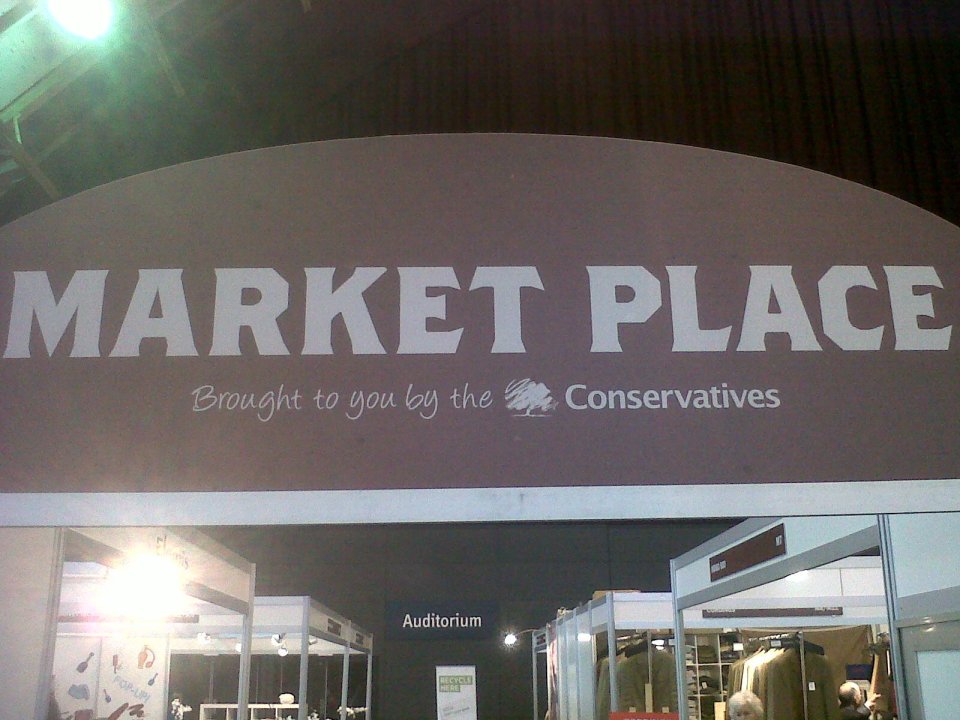
The empty chairs for David Cameron’s speech said it all: the party conference is no longer a political event. This was my eleventh Tory conference, and, even in this short time, I’ve noticed a creeping corporate takeover. The difference struck me yesterday, when I attended a packed fringe meeting in something called the ‘Freedom Zone’. It was set up to discuss banned topics: how to cut taxes, the case for a referendum on EU membership, etc. The crowd was younger, of a libertarian bent — all activists and enthusiasts of some kind, a refreshing change from the sanitised and often lifeless feel of the rest of the official conference.
As I moved back to the official venue, it felt like I was leaving the politics zone and entering the corporate zone. I’m left feeling a bit nostalgic for the old conferences: seaside
meetings, sometimes bust-ups, between the party leadership and party members. But lobbyists are steadily supplanting activists across all political groups. The TUC didn’t even bother to stage
a proper conference this year, staying in London. Its members effectively merged their annual shindig with the Labour Party, to which it provides 85 per cent of the funding.
This shifts the gravity, though. At many fringe groups, the typical question now will come from John Smith from Special Interests Inc, asking why more money isn’t being spent on X. And
they’re often not even questions: more like little speeches to press their organisation’s case. Anyone who went up to Manchester trying to work out what the Tory Party feels about life will
have left none the wiser. The “mood of the hall” is no longer a valuable political indicator.
At their best, conferences are an Edinburgh Festival for politics — ideas discussed in a wonderfully varied setting. Now, it’s more like the Edinburgh Film Festival: a massive junket,
with no one paying for their own bills. This change is reflected in the venues. In the old days, it was seaside resorts, chosen for the abundance of affordable accommodation. That’s what
activists wanted. Now, the conferences are held in cities, the better to entertain the ravenous political class. It leads to the bizarre spectacle of everyone coming up from London to eat and drink
with each other, then getting the train back down again.
I can understand why the parties have allowed this. The steady separation between political parties and voters is shown by a mass drop in membership. (The Conservatives don’t release their membership figures anymore, I suspect
for a reason). So, how do they raise money? One option is to nationalise themselves, with state funding. The other option is to accept that party conference is a chance to raise cash.
Lobbyists’ funding, of course, influences the topics discussed at the think-tank events that they sponsor. These organisations have every right to make their case to government: much
political debate in Britain is made possible by generous corporate sponsorship. The key is keeping a balance. The balance now is wrong: lobbying in conference is supplanting political debate, which
I think is a shame.
If conferences are increasingly attended by people who are there to meet each other, no wonder there are empty seats in the hall. Most of the passholders couldn’t care less about what’s being said in the hall. It reflects a deeper malaise across our politics more generally. If David Cameron noticed a bit on an echo as he spoke today, that’s why.
UDPATE: AdamDR makes a very good point: there were many excellent fringes this year, which were packed with activists.The two think tanks I’m involved with, the Centre for Social Justice and the Centre for Policy Studies, asked bold and necessary questions. The mood at their events was upbeat. Although I have to say that every question asked during the interview with IDS that I conducted on Sunday night came from a lobbyist or an NGO. I will not criticise, as without the support of AgeUK and Prudential the IDS session on Sunday night would not have happened. Both of them simply want to promote discussion, and I wasn’t influenced in any way by them. But I agree with Tim Montgomerie’s thoughts on ConservativeHome this morning. It’s a question of balance, and the balance has slipped too far away from the activists.









Comments